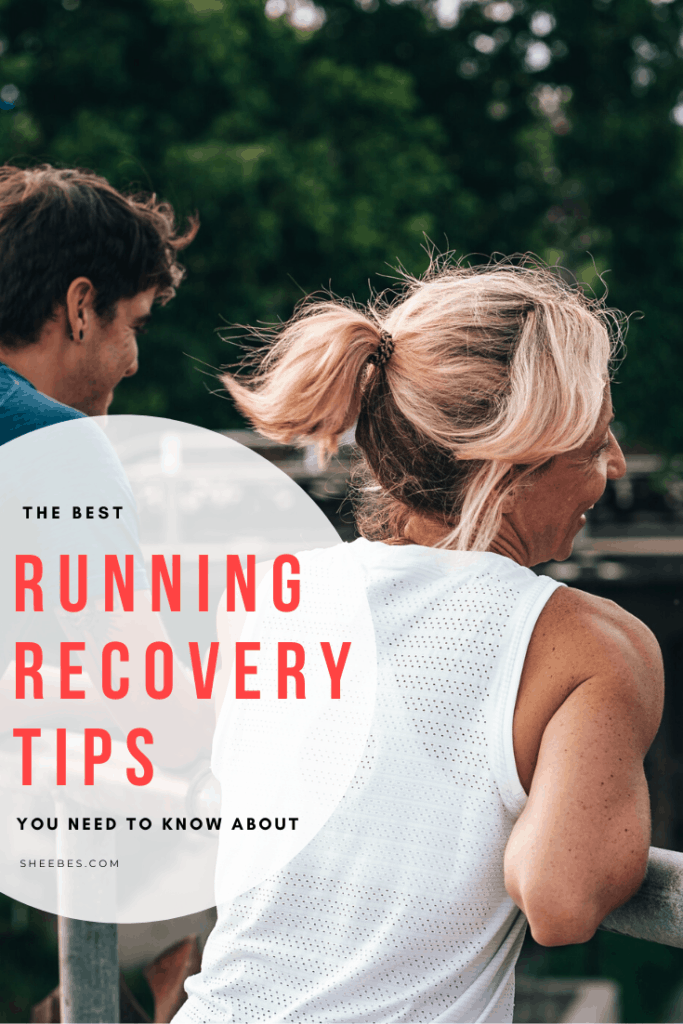What if the secret to avoiding running burnout and injury lies in your running recovery?
Here you’ll learn running recovery tips, why it’s important to take recovery days and what to do. And the result? You’ll train harder, get faster, and avoid injury.
Let’s dig into running recovery tips that’ll keep you running strong.

Whether you’re a runner looking for running tips or a cyclist searching for cycling advice, this site is here to help you elevate your fitness game.

Sheebes is here to give mental toughness tips and resources to help you, the endurance athlete, achieve your personal best. To keep the lights on and content free, we are a participant in the Amazon Services program and other select affiliate networks. This means if you click on an affiliate link below, Sheebes will earn a small commission, at no cost to you.
THE BEST RUNNING RECOVERY TIPS YOU NEED TO KNOW
WHAT IS RUNNING RECOVERY?
Running recovery means easy runs (aka active recovery) and rest days. This gives the body time to absorb and adapt to training.
It also requires mental fortitude, meaning:
- Slowing the pace even though you can run faster (Running slow helps you run fast.)
- Admitting you need a day off. (Remember, you grow stronger with rest.)
- Avoiding the comparison trap of comparing yourself to other runners (Maybe step away from social media?)
WHY RUNNING RECOVERY DAYS ARE SO IMPORTANT
Running recovery days help you:
- Recharge physical and mentally
- Reevaluate and refocus on your goals
- Rebuild your muscles (These two recovery drink mixes might help: this or this.)
- Reduce your injury risk
Without enough recovery sprinkled into your running schedule, you might:
- Have runs that feel like a slog
- Lose passion and enjoyment for running (but you can get it back)
- Overtrain or burnout
Though you’ll find running recovery tips below, you are your best resource because your rest and recovery needs are unique to you.
(But if you want to speed recovery, many professional athletes turn to this device.)
HOW MUCH RECOVERY TIME DO YOU NEED BETWEEN RUNNING DAYS?
Your recovery time depends on many variables: sleep, stress, muscle soreness, and more.
But you can use a few guidelines to help you decide how much recovery you need.
We need a certain amount of energy to take us through the day. And some days we are more energetic than others.
For example, if you skimped on sleep, your energy dwindles. Everything throughout the day requires more effort on your part, running included.
SO DO YOU REST OR DO AN EASY RUN? ANSWER THESE 3 QUESTIONS.
1. Are you exhausted? Rank this on a scale of 1-7, 7 = exhausted.
2. Have you had several days of bad runs?
3. Do you have a cold or the flu?
TAKE A COMPLETE REST DAY IF…
- You’ve ranked your tiredness over 5.
- You’ve had a series of bad runs.
- You have a cold/ flu.
DO AN EASY RECOVERY RUN IF…
You had a hard run yesterday.
AN EASY RECOVERY RUN IS…
An easy run, anywhere from 15—60 minutes, typically done the day after a hard run.
So how easy should your easy runs be?
You’ll find three ways to help you decide.
3 WAYS FOR YOU TO DETERMINE YOUR EASY RUN PACE
- Heart rate: Stay within your recovery run zone by heart rate. Runner’s World has a great post on how to do this.
- Pace: Take 65% of your 5k (or projected 5k) pace.
- Perceived effort: Run at a ridiculously easy pace.
Consider this advice from running coach Brad Hudson:
“The single most common training error I see in competitive runners is running too hard on supposed easy days.
There’s no shame in running slow.
Running slow allows you to run longer, and it also enables you to run harder when you want to run hard.
A longer, slower recovery run is better than a short, after one, because a longer recovery run adds more volume to your training, and again, volume it the number-one determinant of running fitness.
I’ve also found that very slow recovery runs are less likely to leave runners feeling flat in their next hard workout.
Many runners fail to recover adequately from their hard workouts because they run too hard on their easy days.
As a result, their performance suffers in their next hard workout.”
HOW OFTEN SHOULD YOU TAKE A RECOVERY WEEK?
No runner is a machine.
Because of this, your body needs extended downtime, despite easy runs and rest days.
Take a recovery week every 3-4 weeks to let your body rest grow stronger.
A recovery week means a reduction in your mileage—by about 30%. For example, you could take an extra day off to reduce your weekly running volume.
THE BEST FOODS FOR RUNNING RECOVERY
Research shows that both carbs and protein stimulate muscle recovery, especially when consumed within 30 minutes after moderate to high-intensity runs of over 60 – 90 minutes.
Grain bowls with your choice of grain (this one’s quick), protein, veggies, and nuts for crunch are a great option.
Do you like creating your own meals? Come one over to this post for the best cookbooks for runners.
Need to go, convenient options? These running recovery foods are a good bet.
- Plant-based peanut butter chocolate trail bar with chocolate chunks, cranberries, and raisins
THE BEST RUNNING RECOVERY DRINKS
You’ve probably heard that chocolate milk (or this plant-based option) is the best running recovery drink post-run.
There’s compelling evidence that 8 ounces of tart cherry juice helps recovery by reducing muscle damage and inflammation. Too tart? Dilute it with sparkling water, coconut water, or another liquid you enjoy.
You’ll find even more information on the best recovery drinks for runners here.
THE BEST RUNNING RECOVERY COMPRESSION SOCKS
Compression socks are designed to push your blood from your feet toward your heart to speed recovery.
Though you may not find concrete scientific proof that running recovery socks work, many runners love the way they feel after a hard run.
Try it for yourself and see if you like them.
Looking for running recovery compression socks? You’ll find a few recommendations below.
CONCLUSION
It’s easy to forget that rest and recovery are crucial pieces to becoming a better, mentally tougher runner.
But running easy and rest days help you make the most of your training.
Run easy today to run hard tomorrow.